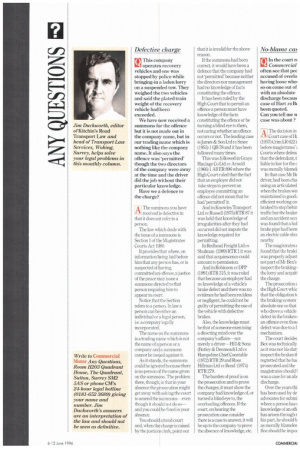This company operates recovery vehicles and one was stopped by
Page 47

If you've noticed an error in this article please click here to report it so we can fix it.
police while bringing-in a laden lorry on a suspended tow. They weighed the two vehicles and said the plated train weight of the recovery vehicle had been exceeded.
We have now received a summons for the offence but it is not made out in the company name, but in our trading name which is nothing like the company name. It also says the offence was 'permitted' though the two directors of the company were away at the time and the driver did the job without their particular knowledge.
Have we a defence to the charge?
A The summons you have _111. received is defective in that it does not refer to a person.
The law which deals with the issue of a summons is Section 1 of the Magistrates Courts Act 1980.
It provides that where, on information being laid before him that any person has, or is suspected of having, committed an offence, a justice of the peace may issue a summons directed to that person requiring him to appear in court.
Notice that the Section refers to a person. In law a person can be either an individual or a legal person, i.e. a company legally incorporated.
The name on the summons is a trading name which is not the name of a person or a company and a summons cannot be issued against it.
As it stands, the summons could be ignored because there is no person of the name given on the summons The problem there, though, is that in your absence the prosecution might get away with asking the court to amend the summons—even though it should not do so— and you could be fined in your absence.
You should attend court and, when the charge is raised by the justices clerk, point out that it is invalid for the above reason.
If the summons had been correct, it would have been a defence that the company had not 'permitted' because neither the directors nor management had no knowledge of facts constituting the offence.
It has been ruled by the High Court that to permit an offence a person must have knowledge of the facts constituting the offence or be turning a blind eye to them, not caring whether an offence occurs or not. The leading case is James & Son Ltd vs Smee 0955) 1 QB 78 and it has been followed many times.
This was followed in Grays Haulage Co Ltd vs Arnold (1966) I All FR 896 where the High Court ruled that the fact that an employer did not take steps to prevent an employee committing an offence did not mean that he had 'permitted' it
And in Knowles Transport Ltd vs Russell (1975) RTR 87 it was held that knowledge of irregularities after they had occurred did not impute the knowledge required for permitting.
In Redhead Freight Ltd vs Shulman (1989) RTR 1 it was said that acquiescence could amount to permission.
And in Robinson vs DPP (1991) RTR 315, it was ruled that because an employer had no knowledge of a vehicle's brake defect and there was no evidence he had been reckless or negligent, he could not be guilty of permitting the use of the vehicle with defective brakes.
Also, the knowledge must be that of someone exercising a directing mind over the company's affairs not
merely a driver Hill & Sons (Botley & Denrnead) Ltd vs Hampshire Chief Constable (1972) RTR 29 and Ross Hillman Ltd vs Bond (1974) RTR 279.
The burden of proof is on the prosecution and to prove the charges, it must show the company had knowledge of, or turned a blind eye to, the overloading offences. If the court, on hearing the prosecution case consider there is a case to answer, it will be up to the company to prove the absence of knowledge, etc.






















































































































